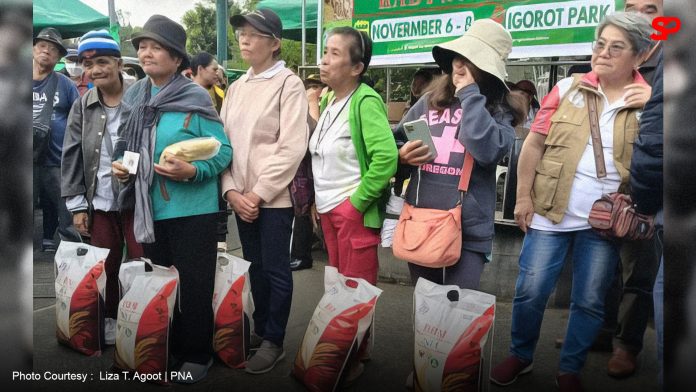By Michelle Ducut
Around 200 low-income households in Baguio City purchased rice at the subsidized rate of PHP29 per kilo on Wednesday, part of the government’s Bagong Bayaning Magsasaka (BBM) program to increase affordable rice access for marginalized communities.
Held at Igorot Park during the National Irrigation Administration’s (NIA) celebration of Livestock and Poultry Month, the rice distribution was facilitated through the Kadiwa ng Pangulo initiative. The initiative, launched by the Department of Agriculture and supported by other government agencies, seeks to bring low-cost agricultural goods directly to consumers, addressing rising food prices and supply shortages.
The rice offered, harvested from contracted farms under the BBM program, represents the first of 10, 000 ten-kilogram packs to be distributed from the Cordillera region’s contract farming initiative. The program currently involves 496 hectares of rice farms across Kalinga and Apayao, where farmers receive subsidies for rice production and, in return, supply part of their yield to government-affiliated markets at lower prices.
NIA-Cordillera Operations Section Chief Liza Jane Challikis explained that the contract farming program is intended to boost local rice yields and support participating farmers financially. Farmers receive subsidies totaling PHP 125, 000 per hectare, covering land preparation, seed purchase, and household support, with additional funds allocated for harvesting and processing. In return, farmers sell a specified portion of their harvest to the government, while any surplus is retained for personal sale, providing additional income.
Beneficiaries at the event expressed relief at the discounted price, as rice prices in Baguio typically hover around PHP60 per kilo. Dominga Dao-ay, a 68-year-old resident of Chapiz Village, noted that her family could stretch the 10 kilograms of rice to last a week, providing substantial savings on essential groceries. Another resident, Lina Buenafe from Lower Fairview, mentioned borrowing money to afford the bulk purchase, highlighting the acute financial needs many low-income families face.
The BBM rice initiative aligns with broader government efforts to stabilize rice prices in response to inflation and recent typhoons that have disrupted food supply chains across the Philippines.

